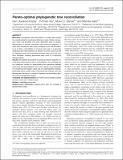Pareto-optimal phylogenetic tree reconciliation
Author(s)
Libeskind-Hadas, Ran; Wu, Yi-Chieh; Bansal, Mukul S.; Kellis, Manolis; Wu, Yi-Chieh
DownloadLiebeskind-Hadas-2014-Pareto-optimal phylogenetic.pdf (550.6Kb)
PUBLISHER_CC
Publisher with Creative Commons License
Creative Commons Attribution
Terms of use
Metadata
Show full item recordAbstract
Motivation: Phylogenetic tree reconciliation is a widely used method for reconstructing the evolutionary histories of gene families and species, hosts and parasites and other dependent pairs of entities. Reconciliation is typically performed using maximum parsimony, in which each evolutionary event type is assigned a cost and the objective is to find a reconciliation of minimum total cost. It is generally understood that reconciliations are sensitive to event costs, but little is understood about the relationship between event costs and solutions. Moreover, choosing appropriate event costs is a notoriously difficult problem.
Results: We address this problem by giving an efficient algorithm for computing Pareto-optimal sets of reconciliations, thus providing the first systematic method for understanding the relationship between event costs and reconciliations. This, in turn, results in new techniques for computing event support values and, for cophylogenetic analyses, performing robust statistical tests. We provide new software tools and demonstrate their use on a number of datasets from evolutionary genomic and cophylogenetic studies.
Date issued
2014-06Department
Massachusetts Institute of Technology. Department of Electrical Engineering and Computer ScienceJournal
Bioinformatics
Publisher
Oxford University Press
Citation
Libeskind-Hadas, R., Y.-C. Wu, M. S. Bansal, and M. Kellis. “Pareto-Optimal Phylogenetic Tree Reconciliation.” Bioinformatics 30, no. 12 (June 15, 2014): i87–i95.
Version: Final published version
ISSN
1367-4803
1460-2059